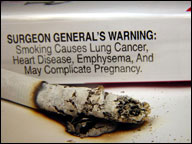The Health Consequences of Smoking (2004)
Smoking & How to Quit Home > Surgeon General's Reports > The Health Consequences of Smoking (2004)
 This Surgeon General's Report expands the list of diseases caused by smoking. The report has four major findings: This Surgeon General's Report expands the list of diseases caused by smoking. The report has four major findings:
- Smoking harms nearly every major organ of the body. It causes many diseases and harms health in general.
- Quitting smoking has immediate as well as long-term benefits. Within minutes and hours after smokers inhale that last cigarette, their bodies begin a series of changes that continue for years. Among these health improvements are a drop in heart rate and improved blood flow. Other health benefits include reduced risk of heart attack, lung cancer, and stroke.
- Smoking low-tar and low-nicotine cigarettes provides no clear benefit to health.
- The list of diseases caused by smoking has been expanded. It now includes these diseases:
- abdominal aortic aneurysm—the major artery from the heart becomes large and usually breaks open and bleeds
- acute myeloid leukemia—a type of leukemia, or blood cancer
- cataract—cloudiness in the eye that makes it hard to see
- periodontitis—inflammation of the bone, connective tissue, and gum surrounding a tooth
- pneumonia—an inflammation of the lungs, usually caused by an infection
- cancers of the cervix, kidney, pancreas, and stomach
The report also notes the harm that cigarette smoking does to a woman's reproductive system. In particular, smoking:
- makes it harder to get pregnant
- increases the risk of never becoming pregnant
- increases the risks of pregnancy problems. These include premature or early birth, low birth weight infants, stillbirth, and infant death.
To read the full report or the summary, go to www.hhs.gov/surgeongeneral/library/smokingconsequences.
Content last updated March 19, 2008.
|
![]() You may need to download a free PDF reader to view files marked with this icon.
You may need to download a free PDF reader to view files marked with this icon.